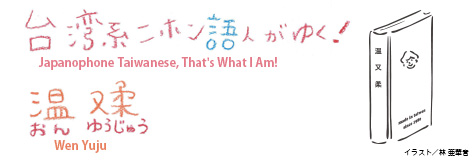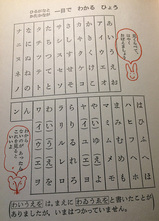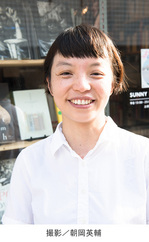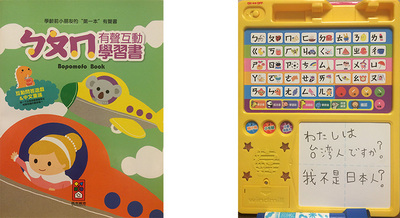
2. I am an Almost-Japanese Taiwanese
This happened during spring break in my second year of high school.
We traveled by plane from Tokyo to Taipei, and after disembarking from the plane, while my family waited at the baggage claim, I went to the bathroom on my own. Then, as I tried to return to them, I got a bit lost due to my lack of a sense of direction. As I was wandering around, I heard someone asking me a question:
"Are you Japanese?"
A gentleman roughly about the age of my grandfather was smiling at me.
"Miss, you are Japanese, aren't you?" he continued in fluent Japanese. I, however, was unable to respond immediately. The gentleman changed his question.
"Did you come from Japan?"
Finally, I managed a response.
"...Yes."
In that moment, his face lit up.
"Welcome to Taiwan!"
Not only his words, but his entire countenance expressed a welcoming attitude. Having no idea what to say to the gentleman who believed I was Japanese, I just stood there in stunned silence.
Fortunately, at that moment a woman called him in Chinese: "Bà ba, wo men zou le! (Let's go, Dad!)" His daughter, or perhaps wife, I presumed. Prompted by this woman, who looked to be around the age of my mother, the gentleman departed as I bowed to him. The friendly smile stayed on his face throughout our brief encounter.
(Welcome to Taiwan!)
Did Grandpa ever greet Japanese visitors with these words?
Just like that gentleman, my grandfather, too, was fluent in Japanese. And not only my grandfather. His brother-in-law, my granduncle, speaks beautiful Japanese that would put even Japanese people to shame.
That is why I was not in the least surprised by the fact that an elderly Taiwanese gentleman spoke to me in such smooth Japanese.
At long last, I found my parents and younger sister, who had been eagerly waiting for me, and as soon as I approached them, my mother scolded me.
"You're late! Where have you been?"
I told my parents how I had just been asked whether I was Japanese.
"And what did you reply?" asked my father with interest.
"I said yes..."
"But Sis, you are Taiwanese!"
"That's not all. After he asked me whether I was Japanese, the gentleman asked if I had come from Japan. We came from Japan, so my answer was correct."
My father sided with me as I was explaining the situation to my sister.
"Your sister is right. After all, you are very much like Japanese."
My father was right. Without noticing it, I (and my sister) must have become overwhelmingly more Japanese than Taiwanese in the overall impression we created though facial expressions, gestures, non-verbal responses and listening sounds, and even the way we held ourselves.
Perhaps that is the reason why the elderly gentleman asked me: "Miss, you are Japanese, aren't you?"
The following response occurred to me: "I am an almost-Japanese Taiwanese." If I had to write a tagline for myself, this phrase would be it. This discovery filled the 17-year-old me with secret confidence.

While Taiwanese children studied the Bopomofo phonetic notation system, I diligently practiced hiragana and katakana.
Welcome to Taiwan!
It was not until sometime later--after entering university--that I started thinking seriously about the Taiwanese gentlemen who welcome Japanese visitors to Taiwan using Japanese learned more than half a century ago, and the life they had to lead.
 Wen Yuju
Wen Yuju
Author Wen Yuju was born in 1980 in Taipei, Taiwan and moved to Japan with her Taiwanese parents before she turned three. In 2006, she completed the Master's Program of the Graduate School of Intercultural Communication at Hosei University. In 2009, she won the Subaru Prize for Literature with Kokyokoraika. As a Taiwanese person who writes in Japanese, in her creative work she explores the themes of language and identity. Her works include Raifuku no Ie (2011, Shueisha), and Tatta Hitotsu no Watashi no mono dewa nai Namae (2012, Happa-no-Kofu; for Kindle). In 2014, she formed a duo with musician Keitaney-Love Kojima, and launched a series of collaborative performances under the title "mapo de ponto--Kotoba to Oto no Ofukushokan [Correspondence of Words and Sound]," featuring Wen's reading and Kojima's music. Her most recent work is Taiwan umare Nhongo sodachi (2015, Hakusuisha), a collection of essays born from her experience as a Taiwanese person raised in Japan. She appears in Homeland in the Borderland, a documentary film directed by Keiko Okawa, which follows author Hideo Levy as he returns to Taichung, Taiwan, for the first time in 52 years.
![]()
Follow Wen Yuju on Twitter: https://twitter.com/wenyuju
Keywords
Back Issues
- 2022.7.27 Beyond Disasters - T…
- 2022.6.20 Beyond Disasters - T…
- 2021.6. 7 Contributed Article …
- 2021.4.28 Crossing Borders, En…
- 2021.4.27 Contributed Article …
- 2021.4.20 Contributed Article …
- 2021.3.29 Contributed Article …
- 2020.12.22 Interview with the R…
- 2020.12.21 Interview with the R…
- 2020.11.13 Interview with the R…


